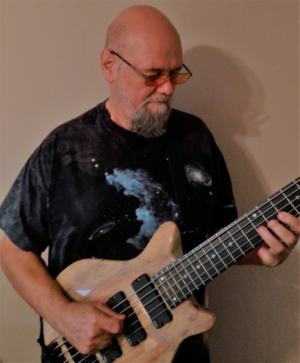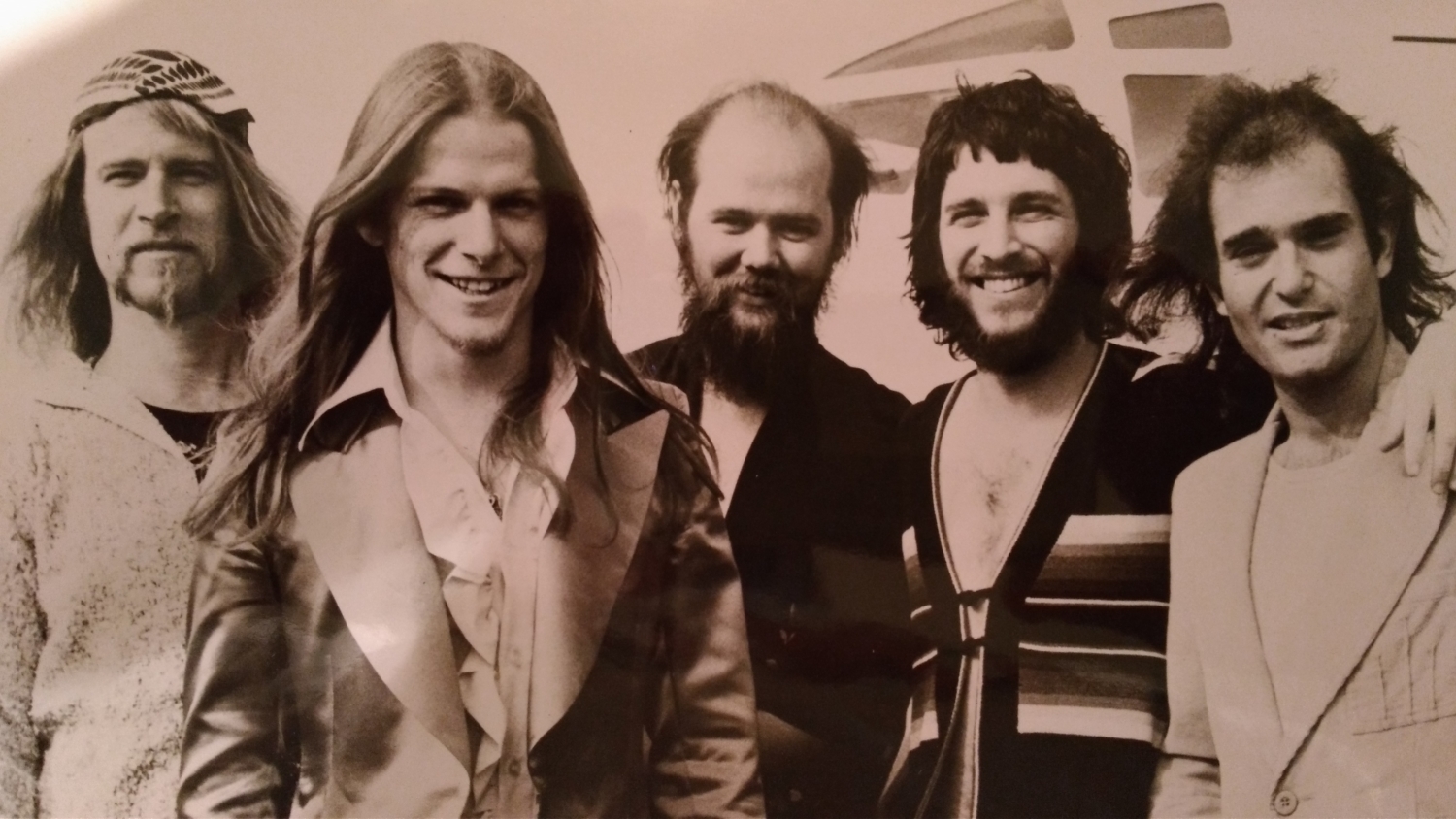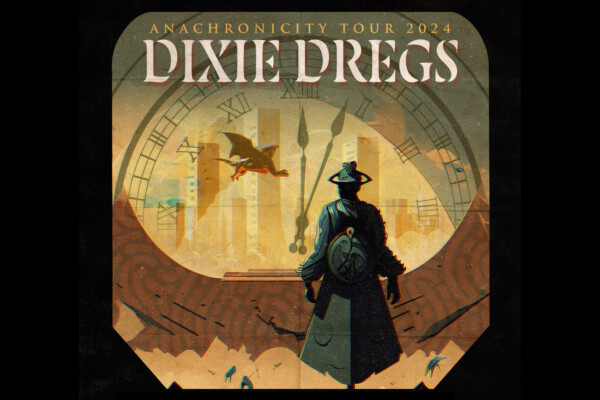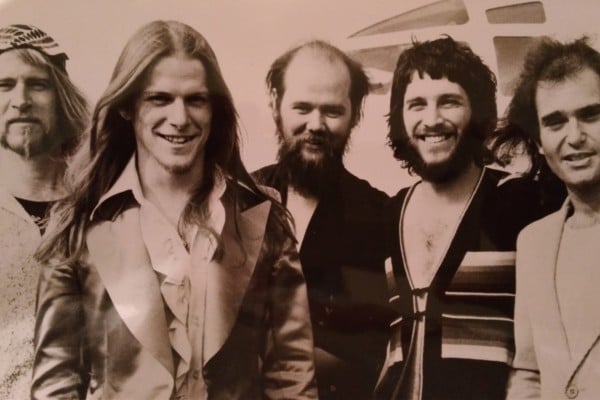Dawn of the Dregs: An Interview With Andy West
 Last year one of the biggest surprises for music lovers was the announcement that the original members of the Dixie Dregs would be reuniting for a tour. That lineup includes guitarist Steve Morse, violinist Allen Sloan, drummer Rod Morgenstein, keyboardist Steve Davidowski, and – of course – bassist Andy West.
Last year one of the biggest surprises for music lovers was the announcement that the original members of the Dixie Dregs would be reuniting for a tour. That lineup includes guitarist Steve Morse, violinist Allen Sloan, drummer Rod Morgenstein, keyboardist Steve Davidowski, and – of course – bassist Andy West.
West co-founded the band with Morse, who now spends much of his time playing in Deep Purple, in 1975 and went on to release their breakout album, Free Fall, in 1977. The album covers a lot of ground in terms of style and technique. West’s bass lines are equally diverse and his solos will turn you on your ear.
The Dixie Dregs “Dawn of the Dregs” tour kicks off February in Clearwater, Florida and will snake around the country through the end of April. We caught up with West to get the scoop on the reunion, his past and current rigs, and how Morse shaped him into the bassist he is today.
Were you surprised at what a huge response there was to this announcement?
Yeah, actually I was. I was incredibly surprised and gratified by it. I mean, we have this whole tour lined up now and ticket sales are really doing great and it still is a ways out. We sold out a couple of shows and I was thought, “Wow, this is cool.”
It was a handful and you really expanded it, right? It’s a full tour now.
Yeah, exactly. So we’ve got kind of east of the Mississippi and West of the Mississippi. We’re covering as much as we can, given the time that we have, which is constrained by a lot of different things, but we are just kind of going for it. So it’s pretty neat.
It is incredible that you’ve gotten together after forty years and that everybody could do it.
Yeah, well, exactly. It was just this weird confluence of timing and opportunity with the poignancy of it being forty years since our first album came out. We’ve had a couple of departures from the band… Both of our other keyboard players are gone: T. Lavitz and Mark Parish. And I they’re not the only ones. Everyone when you get to this age you have people that are just gone and it really puts a point on how temporary this life really is. Sometimes that has an effect on how you think about things. It’s just one of these things where the timing worked out. Steve obviously is very busy and his consideration is probably the largest constraint because he does so much touring and also wants to stay sane by not touring every day of his life. For the rest of us, it’s pretty cool. You know each person has had careers some of us in music some of us not in music. Not to say it’s not without challenges even now, but we all agreed to do it. So we’re doing it.
The Dregs strike me as a band that’s not always about tradition and kind of retrospect. Is it kind of strange for you guys to be doing this?
I don’t think strange is the right term. It’s I think it’s unexpected. I don’t think prior to this moment that it seemed like we could do this. There was no expectation that we would do this so so I don’t think it’s strange in the sense that, “Why are they doing it?” It’s more just you know unexpected.
Thank you for rephrasing for me. I was just thinking that the music itself is just so pushing forward that it doesn’t look back itself.
This is just my perspective, but it seems to be shared so I don’t feel so awkward saying it. A lot of the music, a lot of the compositions that Steve wrote during that time are in my mind timeless. You know he actually captured a kind of thing that is just pure music in his purest and most perfect intent. It’s not about a cultural moment in time. It’s about a musical sentiment expressed by these people and by this composer. And so given that whenever it’s played it’s okay because you know what? There’s no context to it other than the music.
It makes sense that you could appreciate [complex music] because I feel like you have such a technical mind. Do you agree?
Well, yeah. I couldn’t have survived without it, but you know honestly it goes way back. Even in the band and you know we did a lot of very interesting things together. Building my rig back in the day… You know Steve and I both were some of the first people to ever have pitch to voltage converters for synthesizers. I was really into the Mu-Tron stuff – the Bi-Phase and the envelope followers – and then I really didn’t want to have all these wires and shit running around so Twiggs, who is our road manager who’s kind of a legend in his own and it has his own story, he and I built this thing we called it “The Monster.” I said, “Twiggs, I want to plug these things in this order and I want to push a foot switch and have a switch over here and we can try this rack thing with solenoids switches in it and a big snake that ran down to the floor and you know you take the pop off and all that all the pedals were there.” This stuff is so common now but you know thinking back on it, it was very advanced for the time. Lately, it seems like every bass player has a board but back then you just plugged into a tube amp and you’re done and here you had this monster rig.
You also had an Alembic with all those controls.
I read about Alembic in Guitar Player magazine. There was a time when you only gained information through magazines. How else would I ever hear about Alembic? I found a dealer in Charlotte, so I drove to Charlotte and an old dealer called Reliable Music and they had a couple of Alembics. So my soundbite is that I was driving a $200 Volkswagen but it had a $2,000 bass.
My approach has always been somewhat different in terms of the sound that I like. I never was a guy who went for oh I want the sound of this amp like, “I need the Ampeg amp sound.” I never really saw it as organic in the sense that guitar players do. For guitar players, there’s very much a signal path and every aspect of it is important to get that tone.
And for me, I always wanted the cleanest tone possible, even way back then. I had a crazy rig with a couple of folded horn cabinets with a crossover and a couple of double 12 cabinets with JBLs in it and crown amps. I used a very basic Alembic preamp. I love that basic preamp with the bass, treble, mid and that was it. It just got a really really clean sound.
I don’t have any of that stuff anymore. I’ve pared it back. Now I’m using just a basic hi-fi rig. I guess they call it a full-range, flat-response type of thing. I am using Electro-Voice. I’ve got a sub-cabinet and a single 12 like a floor monitor kind of thing, so it’s like a mini p.a. Then I’m using a Line 6 Helix into that and it’s just you know. I was literally going to go with just a computer because I’ve been doing plugins forever and I know how to get exactly what sound I want to use with plugins. I was just really paranoid about technology failure. Technology is what I did, so my brain goes straight to that. We’re just not quite there yet.
I also got a Tech 21 Q-Strip box. Basically what’s nice about this is, again, stuff I’m very familiar with. It’s got a high-frequency shelf and a low-frequency shelf and to parametric mids, so it’s really easy for me just to dial into exactly the sound I want. Honestly, I could just use that straight into the p.a. and I’d be fine because I could get exactly the sound I want out of it, but it doesn’t have the effects in it so I’m kind of going through the Helix for that. The Helix has all kinds of amp models and I can get a little bit of distortion but I haven’t really honestly gotten into it yet so much. I’m still really focused on and learning all the notes for these Dregs songs. So I’m kind of going back to basics, straight through sound to have one or two good bass sounds and have a handful of small effects. You know a delay chorus basic stuff you know a little bit of reverb compression that kind of thing and not go nuts for the Dregs. But it’s all there. So the cool thing is that that little box at the end allows me just to have knobs that I can say I need a little bit more low end in general on this stage you know kind of thing.
We could talk for a few minutes about the whole mystique of the bass itself. You know, some people have a thing about the sound and the roundness and we – as bass players – appropriate whatever adjective we want. It’s this big mysterious thing but by being an engineer I don’t subscribe to that kind of thinking about many things in life. I see sound as a technical problem.
What was it like touring back then? Obviously this is naive, but when I think of touring in the 70s in the southeast I think it’s like the Blues Brothers or something.
Yeah like the Blues Brothers. [laughs] We didn’t know any better obviously because we just grew up and started doing stuff, but playing in bars around the South I mean it was really cool. There’s so much to the story to me. When you form a band and your goal is to make that band successful it’s like a cause, right? And so you go and you play. When we first started it was pretty much me calling bars and saying, “Can we come and play?” For us, it was winning the audience over and until we had a full canon of Steve’s music that we could play, we were playing whatever we knew how to play. It was drawn from rock traditions – Zeppelin, Allman Brothers, you know – until we got heavily into the Mahavishnu thing which then you know my other sound bite is we were like a Mahavishnu Orchestra cover band, you know, which is bizarre.
We learned that it was really kind of about the energy of the music and how people respond to it. So we learned how to engender ourselves to an audience where they would like what we did. And so it wasn’t always about, “Oh you know here’s some stuff you’ll never understand but we’re going to play it anyways.” [laughs] It wasn’t like that. So that’s where a lot of things like “Cruise Control” and “The Bash.” When we finally got on that energy line and understood that people liked that kind of thing, we as musicians and Steve as a composer had his own kind of agenda in terms of what he wanted to write and play. So we would we would intersperse our musically creative type stuff but we’d always frame it in the context of a presentation that people would appreciate or we thought they would.
Now it didn’t always work. We started to plan we’d get a lot of people just leaving. They would be there in the bar for whatever reason but it wasn’t to see us and if we didn’t attract their interest they would leave. But over a couple of years we had enough indicators that we were on a good track in that we would play somewhere and half the people would leave, but when we’d come back the half that stayed would bring their friends and then maybe a little bit less than half would leave that next time until finally, you got to the place where people knew what they were gonna get from us. And that was cool. I really think that we were very, very lucky at the time to have an audience that kind of self-selected itself.

What are you all going to be playing on this tour? Is it going to be strictly Free Fall stuff or are you going to take from throughout the band’s career?
When we decided to do this we started talking about the songs and of course the keyboard player Steve Davidowski was on the first album and who’s part of the band that beat around the South playing those bars we were just talking about. What we did was craft it more from the standpoint of, “Okay, let’s favor the songs on Free Fall because it has been 40 years since we did that album and Steve played on those things.” But you know the first six albums that I played on have such a breadth of character to the songs. We wanted to pick things besides just Free Fall, so we started and then we ended up doing something from every single one of the albums, which is really cool and of course that meant that Steve Davidowski had to learn about an hour’s worth of material that he never played on, but he’s doing great work.
What’s your process been in and learning all this stuff? Do you like to sit down and play some of these tunes or is this you have to go back and say, “What the hell was I doing here?”
Yeah well, it’s actually both of those things. “Assembly Line”, which is a song on Industry Standard that we’re doing… I mean I haven’t played that in forever and I just had to relearn one little part the rest of it I could just play. You know it was weird. Another song we’re doing is called “Day 444,” which is one of Steve’s. On every album, we did this kind of long, orchestrated, slow-moving, very melodic, very harmonically rich tapestry kind of songs. “Day 444” is one of those long slow distance kind of things.
We hadn’t played live so it wasn’t really deeply ingrained in any of our heads. And Steve wanted to do it because we had simply because we hadn’t played it live you know and if we did it was maybe one or once or twice. It’s very orchestrated song you know so studio song really and that one took me, I don’t know, probably two weeks to learn it you know because it’s got these very long.
It’s not like it’s not like it’s hard to play. It’s just that it’s a big long composition with a lot of different parts. It has a couple of repeated sections but then he always does these transitional things that are slightly different. Then the timing is very… I could not tell you what time signature any of this stuff is in. It’s literally like, “OK, I learned it melodically and feel from feel. This is how this part goes.” But in a way, it doesn’t matter because you learn to feel it. You know it’s fun. So it’s been challenging. Some of that stuff we just played a very fast tempo. Back in the day, it was just like everything was about the energy and pushing the edge of what we could play. Now again the bar has been raised so high, you know? I mean I could go you know find ten guys on the Internet right now that could play this far better than I can in terms of speed and accuracy. I can still play, but it’s not instant. Some of the stuff is hard, some of it requires a certain kind of technique. So you just start slow and push it step by step. What I found is even though I’ll be 65 when we start the tour, I can still play all this stuff no problem. You just sit there and you work it out. So that’s the good news, I think. Music is one of those things that you can do for your whole life unless you get very decrepit.
In an old Rolling Stone interview, you were talking about how Steve would show you how to play a lot of these lines that he’d come up with. Do you credit him as a big force in why you became such a great player? Was it him pushing or do you think you were on that track and he just made you do harder stuff?
No, I definitely give that credit to him. Steve was a great friend to me and I’ve loved doing it but I didn’t really know that much about music, per se. I never really became a good journeyman musician. You know, someone who has studied all the greats and figured out how all this stuff works. I learned how to play his music with my thing in it and then when the band broke up in the 80s, I still played and I still do my own kind of thing. But it all sort of stems from that educational point of view. Now obviously if you play music your whole life you’re going to learn stuff every step of the way and that has been true for me, too. But I do feel like the value that I have as a player right now comes a lot from just that schooling of being in the Dregs and playing that music. And I like to bring that stuff out. I mean, I like to kind of highlight the differences in that music you know.
And so for me it’s it’s unusual. I love the bass community. It is so full of cool and interesting people, but sometimes you get a little bit… you know sometimes you can get a little bit stupid. I mean you know things like the pick versus non-pick thing or the four strings versus five versus six.
That kind of stuff is insane. None of that matters. For me, I really enjoy the sound of the pick and you know I read this thing, I can’t remember what it was but someone is talking bad about the pick and you know for me it’s just always about the sound.
When I go hear a band I want to hear what the bass player is playing. So I developed this whole thing with the pick and the midrange and the cutting. And that’s actually what is on those records, so when you hear the bass you hear that kind of tone. It’s not the big fat round tone but you know that’s what I like.
It’s just that [bass purists] limit their appreciation and then they put extra power into their own interpretation. We all do it to some degree on some things so I’m not going to say I’m not guilty, but I don’t think there is such a thing as the right way to play the bass or the right sound of a bass or the right role of the bass.
Are there any plans beyond this tour or are you just kind of seeing where it goes?
Yeah, I think it’s I think it’s “see where it goes.” Obviously, we all live in completely different parts of the country so there are not the same ideas of having a band as there were. But I think we’re all kind of hopeful that this will be just a total blast for us and for the people, and that’s another thing I would like to convey somehow. This may be a little bit… there’s some adjective for this and I hope it’s not taken incorrectly, but when I listen to this music it makes me feel really good. It’s not because I’m going, “Oh this is great because Andy is doing this.” It’s more like I love this music, you know? The people that love this music the way I do feel the same way about it. They love this music and this music gives them something that they don’t get from something else.There’s a unique kind of thing to it. So I just think it’s really cool to be able to present this music for people to have.
I don’t want to put too big of a point on it, but I do think that there is a feeling behind it and there’s a sentiment and there’s an energy to it that is very positive and very nice to have in this day and age. That’s what I think we want to do as a band to convey and have that it’s always about the music and the whole thing. It’s not really about us as individuals.
Dawn of the Dregs 2018 Tour Dates:
| Date | Location | Venue |
|---|---|---|
| Feb 28 | Clearwater, FL | Capitol Theatre |
| Mar 1 | Ponte Vedra Beach, FL | Ponte Vedra Concert Hall |
| Mar 2 | Augusta, GA | Bell Auditorium |
| Mar 3 | Atlanta, GA | Center Stage |
| Mar 5 | Charleston, SC | Charleston Music Hall |
| Mar 6 | Durham, NC | Carolina Theater |
| Mar 7 | Washington, DC | Lincoln Theater |
| Mar 8 | Wilmington, DE | The Grand Opera House |
| Mar 9 | Collingswood, NJ | Scottish Rite Auditorium |
| Mar 10 | Newton, NJ | Newton Theater |
| Mar 14 | Ridgefield, CT | Ridgefield Playhouse |
| Mar 15 | Huntington, NY | The Paramount |
| Mar 16 | New York, NY | Town Hall |
| Mar 17 | Woodstock, NY | Bearsville Theater |
| Mar 19 | Boston, MA | Wilbur Theater |
| Mar 21 | Albany, NY | The Egg |
| Mar 22 | Pittsburgh, PA | Carnegie Music Hall |
| Mar 23 | Cleveland, OH | Kent Stage |
| Mar 24 | Chicago, IL | The Vic Theater |
| Apr 11 | Milwaukee, WI | Pabst Theater |
| Apr 14 | Boulder, CO | Boulder Theatre |
| Apr 20 | San Juan Capistrano, CA | The Coach House |
| Apr 21 | Agoura Hills, CA | The Canyon Club |
| Apr 22 | Phoenix, AZ | Scottsdale Center for the Performing Arts |
| Apr 25 | Dallas, TX | House of Blues |




Andy West is a bass hero and innovator, with incredible technique and groove. So glad to see them touring again. A very special band, that’s for sure.